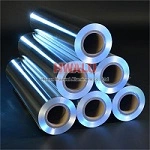Single zero aluminum foil refers to aluminum foil with a thickness between 0.01mm ( 10 micron ) and 0.1mm ( 100 micron ). 0.01mm ( 10 micron ), 0.011mm ( 11 micron ), 0.012mm ( 12 micron ), 0.13mm ( 13 micron ), 0.14mm ( 14 micron ), 0.15mm ( 15 micron ), 0.16mm ( 16 micron ), 0.17mm ( 17 micron ), 0.18mm ( 18 micron ), 0.19mm ( 19 micron ) 0.02mm ( 20 micron ), 0.021mm ( 21 micron ), 0.022mm ( 22 micron ...
What is aluminum foil for pharmaceutical packaging Aluminum foil for pharmaceutical packaging is usually composed of aluminum foil, plastic film, and a glue layer. Aluminium foil has many advantages as a packaging material, such as moisture-proof, anti-oxidation and anti-ultraviolet properties, and can effectively protect medicines from light, oxygen, and moisture. Aluminium foil for pharmaceutical packaging ...
Honeycomb Aluminium foil Details Typical alloy 3003 5052 Temper O,H14, H16, H22, H24, O、H12、H14、H16、H18、H19、H22、H24、H26 Thickness (mm) 0.005-0.2 0.03-0.2 Width (mm) 20-2000 20-2000 Length (mm) Customized Treatment mill finish payment method LC/TT what is Honeycomb aluminum foil? Honeycomb aluminum foil has the advantages of light weight, high strengt ...
Aluminum foil alloys for food container lids Pure aluminum is a soft, light, and easy-to-process metal material with good corrosion resistance and thermal conductivity. It is often used to make the inner layer of food container lids to protect the freshness of food and prevent external contamination. In addition to pure aluminum, commonly used aluminum alloys include aluminum-silicon alloys, aluminum-magnesiu ...
What is the aluminum foil of the burner cover? The aluminum foil cover for the burner head is aluminum foil cover used to protect the burner head. A burner refers to a flame nozzle used on a gas stove, gas stove, or other gas appliances, which is used to mix gas and air and ignite it to produce a flame. During long-term use, grease and dust may accumulate on the surface of the burner, which may affect the qua ...
Aluminum foil pinhole has two main factors, one is the material, the other is the processing method. 1. Improper material and chemical composition will lead to a direct impact on the pinhole content of fake aluminum foil Fe and Si. Fe>2.5, Al and Fe intermetallic compounds tend to form coarse. Aluminum foil is prone to pinhole when calendering, Fe and Si will interact to form a firm compound. The number of ...
Aluminum alloy 1350, often referred to as "1350 aluminum foil", is a pure aluminum alloy with a minimum aluminum content of 99.5%. While pure aluminum is not commonly used in pharmaceutical packaging, aluminum and its alloys (including 1350 aluminum) can be used in pharmaceutical packaging after proper processing and coating. Pharmaceutical packaging requires certain properties to ensure the safety and preserv ...
As a metal material, aluminum foil is non-toxic, tasteless, has excellent electrical conductivity and light-shielding properties, extremely high moisture resistance, gas barrier properties, and its barrier performance is incomparable and irreplaceable by any other polymer materials and vapor-deposited films. of. Perhaps it is precisely because aluminum foil is a metal material completely different from plastic, i ...
What is the difference between aluminum foil and tin foil? Can it be used for oven heating? Is aluminum foil toxic when heated? 1. Different properties: Aluminum foil paper is made of metal aluminum or aluminum alloy through rolling equipment, and the thickness is less than 0.025mm. Tin foil is made of metal tin through rolling equipment. 2. The melting point is different: the melting point of aluminum foil ...
Aluminum Foil VS Aluminum Coil Both aluminum foil and aluminum coil are products made of aluminum, but they have different uses and properties. There are some similarities in properties, but there are also many differences. What are the differences between aluminum foil and aluminum coil? Differences in shape and thickness: Aluminum foil: - Usually very thin, usually less than 0.2 mm (200 microns) th ...
8006 aluminum foil is mainly used for food packaging, such as milk boxes, juice boxes, etc. 8006 aluminum foil has good corrosion resistance and mechanical properties, which can meet various packaging needs. 8011 aluminum foil is a common aluminum alloy material, mainly used in food packaging and pharmaceutical packaging. 8011 aluminum foil has good waterproof, moisture-proof and oxidation-proof properties, an ...








